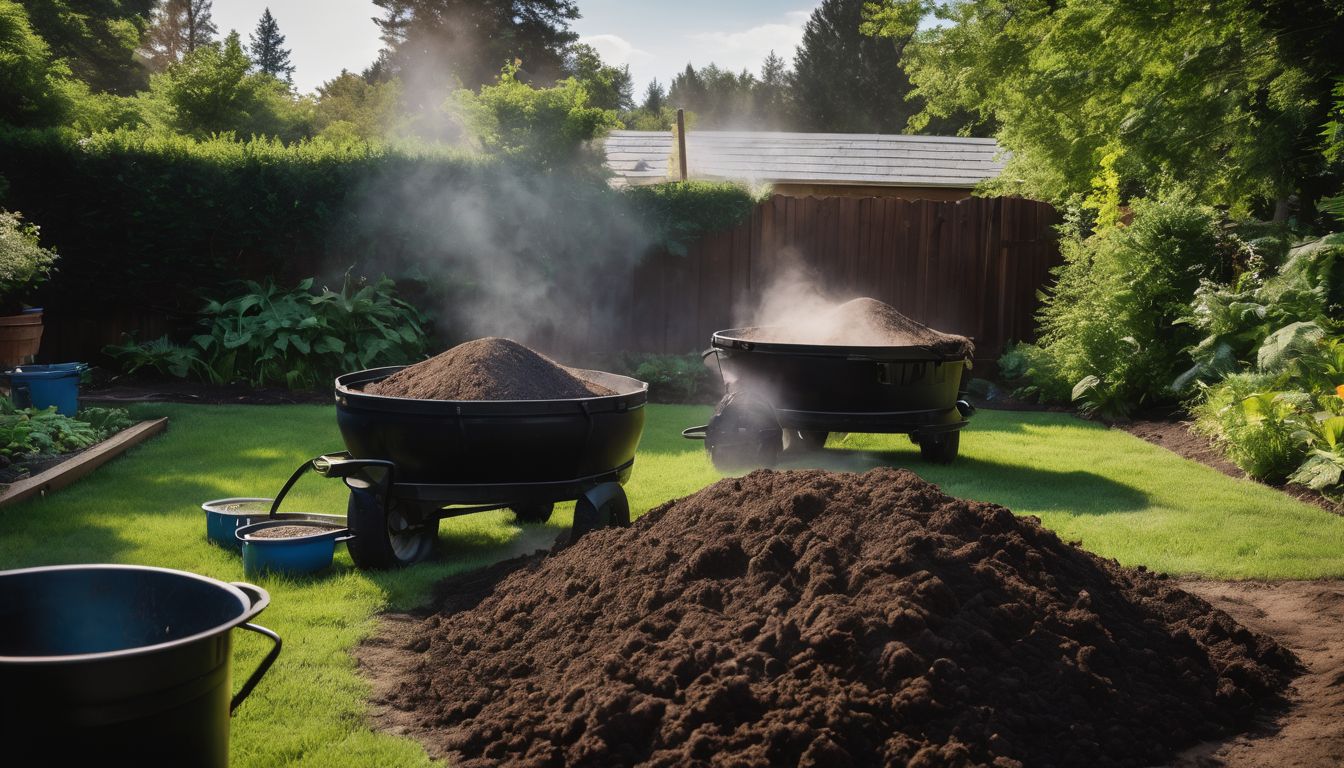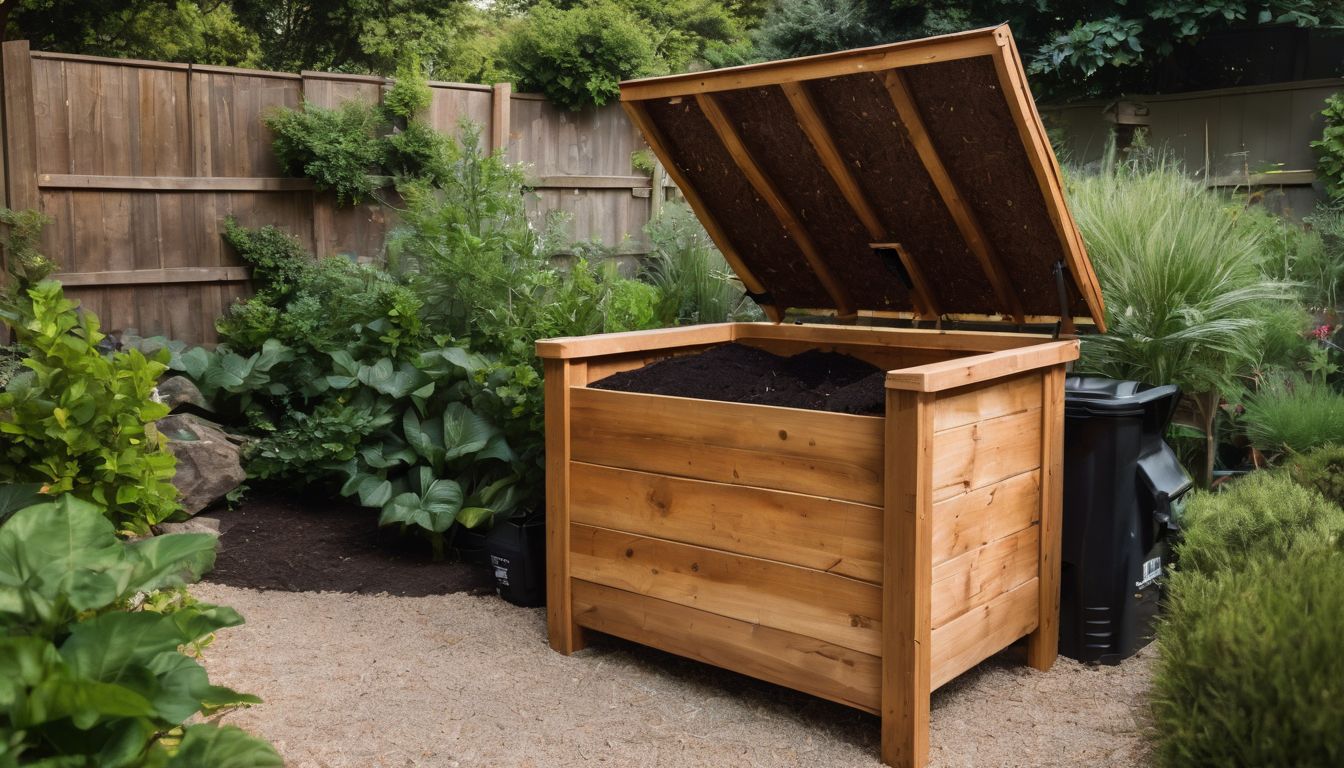Are you worried about the mountains of food waste piling up on our planet? Every year, organic waste contributes to a huge portion of the rubbish ending up in landfills. This article will guide you through composting‘s role in turning this problem around, helping both your garden and the earth.
Dive in and let’s turn waste into wonder!
Key Takeaways
- Composting turns organic waste like food scraps and yard clippings into valuable fertiliser, cutting back on landfill use and reducing harmful methane gas emissions.
- The process creates a healthier soil that retains more water and resists erosion, which means we do not have to rely as much on chemical fertilisers for plant growth.
- By engaging in either home or commercial composting, individuals help fight climate change by lowering their carbon footprint and encouraging sustainable agriculture practices.
- Starting a compost pile is easy; you can recycle fruit peels, coffee grounds, eggshells, leaves and shredded paper while avoiding meat or dairy products to avoid attracting pests.
- Large – scale composting operations significantly divert waste from landfills and play an essential role in promoting environmental conservation efforts worldwide.
Understanding Composting
Composting is the natural process of breaking down organic materials to create a nutrient-rich soil conditioner. Oxygen plays a vital role in the process and can be done at home or on a larger scale by commercial facilities.
Definition of composting
Composting is a natural process that transforms organic waste into valuable fertiliser for the soil. It involves the breakdown of biodegradable materials by microorganisms, fungi, and other decomposers.
This eco-friendly method not only enriches the land but also plays a vital role in waste management by reducing reliance on landfilling, thus minimising methane production and carbon emissions.
Through composting, nutrients are recycled back into the earth, enhancing soil fertility and helping to combat climate change. Organic materials like vegetable scraps, leaves, and paper products become part of this cycle, leading to healthier soil capable of supporting robust plant growth without chemical additives.
By engaging in this sustainable practice at home or commercially, individuals contribute significantly to environmental sustainability and aid in mitigating greenhouse gas emissions that affect human health.
Importance of oxygen in the process
Composting relies on the presence of oxygen to facilitate the breakdown of organic matter. This process, known as aerobic decomposition, is essential for the microorganisms responsible for breaking down waste to thrive and effectively convert organic matter into nutrient-rich compost.
Adequate aeration ensures that beneficial bacteria have access to the oxygen they need to function optimally throughout the composting process, contributing to reduced greenhouse gas emissions, improved soil health, and effective management of organic waste.
Furthermore, oxygen enables a balanced ecosystem within the compost pile by supporting diverse microbial activity. The availability of air in composting systems creates favorable conditions for earthworms and other macroorganisms crucial for efficient decomposition and nutrient recycling.
At-home vs. commercial composting
Understanding the different scales at which composting takes place is crucial for environmentally conscious individuals. At-home composting is a personal endeavour, while commercial composting is on a larger, industrial scale. Below is a comparison of both methods in a user-friendly table format.
| At-Home Composting | Commercial Composting | |
|---|---|---|
| Scale | Small, personal | Large, industrial |
| Input Materials | Household organic waste | Wider variety, including large volumes of food scraps, yard waste, and agricultural residues |
| Process Control | User managed, less precision | Professionally regulated, with precise temperature and aeration control |
| Time Required | Variable; dependent on attention and conditions | Faster, due to optimised conditions |
| End Product | Generally used on personal gardens | Often sold or used for large-scale landscaping or agricultural applications |
| Environmental Impact | Reduces household waste, lowers carbon footprint | Significantly diverts waste from landfills on a larger scale, reducing greenhouse gases |
| Economic Aspects | Saves money on fertilisers, encourages sustainable living | Creates jobs, supports local agriculture, contributes to the green economy |
| Accessibility | Easy to start, requires minimal space and equipment | Requires large facilities, more complex systems and infrastructure |
Each method plays a significant role in the move towards sustainable waste management and soil enhancement.
Environmental Benefits of Composting
Composting has numerous environmental benefits, including reducing food waste, diverting materials from landfills, curbing greenhouse gas emissions, improving soil health, enabling water retention, and controlling erosion.
These benefits contribute to overall climate change mitigation and environmental conservation efforts.
Reducing food waste
Reducing food waste is a crucial aspect of composting, as it prevents organic materials from ending up in landfills where they produce harmful methane gas. By diverting food scraps and other biodegradable waste to compost instead of throwing them away, we can significantly reduce the amount of greenhouse gases emitted into the atmosphere.
This process not only lessens our environmental impact but also contributes to improving soil health and reducing soil contamination by promoting the natural decomposition of organic matter.
In addition to reducing greenhouse gas emissions, redirecting food waste to compost bins serves as an effective way to manage organic materials sustainably. By doing so, we help lessen our contribution to climate change while simultaneously enriching the nutrients in soil and supporting overall environmental conservation efforts.
Diverting materials from landfills
Composting diverts organic waste from landfills, reducing soil contamination and curbing methane production. This process aids in decreasing carbon emissions, contributing to environmental conservation.
By diverting materials from landfills, composting helps prevent the creation of harmful greenhouse gases.
This practice supports a more sustainable approach to waste management and plays a critical role in promoting environmental health and sustainability. Composting offers an effective solution for minimising the impact of organic waste on our planet’s ecosystems while creating a positive impact on soil quality and overall environmental well-being.
Curbing greenhouse gas emissions
Composting reduces greenhouse gas emissions by preventing organic waste from decomposing in landfills and producing methane, a potent greenhouse gas. When organic matter is composted, the breakdown process occurs aerobically, which significantly lowers methane production compared to anaerobic decomposition in landfills.
Furthermore, using compost as a soil amendment increases carbon sequestration in the soil, helping to mitigate climate change by capturing carbon dioxide from the atmosphere.
By diverting organic waste from landfills and utilising it for composting, we can effectively reduce our carbon footprint and contribute to addressing climate change. Not only does this method help combat greenhouse gas emissions but also enriches soil health, supporting sustainable agriculture and environmental conservation.
Improving soil health
Improving soil health is one of the key environmental benefits of composting. Composting enriches the soil with essential nutrients, improving its fertility and structure, which enhances plant growth.
By adding organic matter to the soil, it increases microbial activity and promotes biodiversity.
The process reduces the need for chemical fertilisers, thus preventing soil contamination while promoting sustainable agricultural practices. Improved soil health also enables better water retention and erosion control, contributing to overall environmental conservation efforts.
Enabling water retention
Composting enables water retention in soil, helping to reduce the need for irrigation and saving water. As organic matter breaks down, it creates a sponge-like structure that holds moisture, promoting healthier plant growth and enhancing soil fertility.
This process also mitigates the risk of erosion by stabilising the soil against heavy rainfall or runoff, contributing to overall environmental sustainability.
In addition to reducing food waste and curbing greenhouse gas emissions, composting plays a crucial role in maintaining healthy soil ecosystems by enabling water retention and preventing erosion.
Controlling erosion
Composting helps control erosion by improving soil structure and stability. Organic matter in compost enhances the soil’s ability to retain moisture, reducing surface runoff and preventing soil erosion.
This process also fosters the growth of microorganisms that bind soil particles together, further strengthening its resistance to erosion.
Moreover, composting reduces the need for chemical fertilisers, decreasing the risk of agricultural runoff that contributes to waterway pollution and sedimentation. As a result, composting plays a crucial role in protecting natural habitats and maintaining healthy ecosystems by preventing excessive soil loss due to erosion.
Economic Benefits of Composting
Composting supports local farms and urban gardens, fosters environmentalism, and promotes outdoor activity. Read on to discover how composting can create new life and economic opportunities for communities.
Supporting local farms and urban gardens
Composting supports local farms and urban gardens by providing nutrient-rich soil amendments, reducing the need for chemical fertilisers, and promoting sustainable agriculture. By using compost as a natural fertiliser, farmers can enhance soil fertility, improve crop yields, and support healthy ecosystems.
Urban gardens benefit from composting by creating a closed-loop system of organic waste management that reduces landfill diversion and contributes to soil contamination reduction. This process fosters community environmentalism, promotes outdoor activity, and strengthens connections between urban dwellers and their local food sources.
In addition to supporting local farms and urban gardens with nutrient-rich soil amendments, composting encourages environmentally conscious individuals to actively participate in sustainable solutions for organic waste management while fostering a sense of community responsibility towards conserving the environment.
Fostering environmentalism and promoting outdoor activity
Engaging in composting fosters environmentalism by reducing waste and curbing emissions, while promoting outdoor activity. It encourages individuals to get involved in hands-on conservation efforts, cultivating a deeper connection with the environment.
Outdoor composting also provides an opportunity for physical activity and gardening, nurturing a better understanding of how small actions can positively impact the planet.
By integrating composting into daily routines, environmentally conscious individuals actively contribute to carbon emissions reduction and methane production avoidance, demonstrating their commitment to sustainable living.
Creating new life
Composting brings new life as organic waste materials break down to create nutrient-rich soil. Through this process, food scraps and yard waste are transformed into a valuable resource that supports the growth of plants and crops.
This rich compost fosters healthy ecosystems by enriching the soil with essential nutrients and microorganisms, promoting biodiversity, and sustaining plant life. Additionally, composting reduces reliance on chemical fertilisers, supporting sustainable agricultural practices vital for preserving our environment.
Creating new life through composting is not only beneficial for gardens and farms but also contributes to a healthier planet overall by reducing greenhouse gas emissions from landfills while minimising the need for synthetic chemicals in agriculture.
How to Start Composting
To start composting, begin by choosing what to compost and understanding the process. Look into major composters in the industry and explore the carbon and co-benefits of composting.
Choosing what to compost
To compost effectively, consider the following items for your compost pile:
- Fruit and vegetable scraps: These are great sources of nutrients for your compost, such as banana peels, apple cores, and potato skins.
- Coffee grounds and filters: These add nitrogen to the compost, giving it an extra boost.
- Yard waste: Leaves, grass clippings, and small branches can also be added to provide carbon for the mix.
- Eggshells: Providing calcium to the compost, these shells help balance the acidity of the pile.
- Paper products: Shredded newspaper, cardboard, and other paper products can be included in moderation to help aerate the mix.
Understanding the composting process
Composting is a natural process where organic matter decomposes, transforming into nutrient-rich soil. Oxygen plays a crucial role in this process, allowing microorganisms to thrive and break down the materials effectively.
Home composting involves managing smaller piles or bins, while commercial composting handles larger volumes and stricter regulations.
Microorganisms break down food scraps and yard waste during composting, reducing the amount of material sent to landfills. This diversion helps minimise greenhouse gas emissions from decaying organic matter in landfills.
Major composters in the industry
Several major companies lead the way in large-scale composting operations. These industry leaders utilise advanced technologies to efficiently process organic waste and byproducts, ensuring minimal environmental impact.
They partner with local communities, businesses, and agricultural institutions to facilitate the collection of organic materials for composting. Through their innovative methods, these companies play a crucial role in diverting significant amounts of waste from landfills while producing high-quality compost for various applications.
Moreover, these industry heavyweights continually invest in research and development to enhance their composting processes and expand their reach across different sectors. As a result, they contribute significantly to reducing greenhouse gas emissions and promoting sustainable practices on a global scale.
Carbon and co-benefits of composting
In addition to the environmental benefits, composting plays a crucial role in reducing carbon emissions. As organic materials break down in landfills, they release methane, a potent greenhouse gas.
Composting these materials instead significantly reduces methane emissions and helps mitigate climate change. Furthermore, by utilising compost in agriculture and landscaping, it improves soil health and fertility while reducing the need for chemical fertilisers.
This not only contributes to carbon sequestration but also promotes sustainable farming practices.
Moreover, the co-benefits of composting extend beyond environmental impact; it positively influences local communities by creating green jobs and supporting urban agriculture initiatives.
Concluding Thoughts
Composting is a simple yet impactful way to reduce waste and contribute to a healthier environment. As environmentally conscious individuals, supporting conservation through composting can help divert organic material from landfills, curb greenhouse gas emissions, and improve soil health.
By choosing what to compost wisely and understanding the process involved, we can actively participate in creating new life while fostering environmentalism within our communities.
Considering the numerous environmental benefits of composting, embracing this eco-friendly practice can make a significant impact on local ecosystems and support sustainability efforts.
In addition to reducing food waste and controlling erosion, composting supports local farms and urban gardens by enriching soil quality for growing nutritious produce. It’s an opportunity for us all to contribute positively towards conservation and environmental preservation through simple yet effective actions like composting.
Conclusion
In conclusion, composting is a simple but effective way to reduce food waste and greenhouse gas emissions. It also helps improve soil health and prevent erosion. Starting your own composting routine can make a significant environmental impact while supporting local farms and gardens.
Get started today and be part of the solution!
FAQs
1. What does composting do for the environment?
Composting helps the environment by breaking down organic waste into a natural fertiliser, reducing landfill waste, and cutting down on greenhouse gas emissions.
2. Can composting improve soil quality?
Yes, compost added to soil can boost its health, aiding in plant growth and restoring vital nutrients back into the earth.
3. Does composting reduce our carbon footprint?
Absolutely, since composting organic materials prevents them from decomposing anaerobically in landfills, which usually produces methane – a potent greenhouse gas.
4. Is it true that compost can help with water conservation?
Indeed it is; when you use compost in gardens or farms, it increases the soil’s ability to retain moisture which leads to less need for watering.





